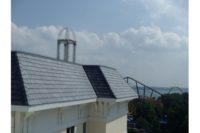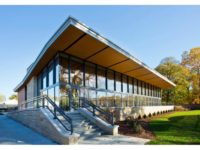The National Aquarium Gets New Glass on Pyramid Overlooking Baltimore’s Inner Harbor

Photography by Federal Hill Photography, LLC.
A famous landmark in Baltimore’s Inner Harbor since 1981, the National Aquarium showcases Beluga whales, a simulated rain forest, coral reef, shark tank, 4D theater and fish from the Amazon to the Atlantic.
Designed in the shape of a ship with triangles of glazing representing the sails, the aquarium is the state’s largest tourist attraction with an annual attendance of 1.5 million visitors.
To improve the overall efficiency of the building envelope and functionality of the Rainforest habitat below the upper glass pyramid, Solarban® 60 Starphire® 60 glass was selected to replace the glazing.
Working within a sensitive marine life setting with specific environmental parameters, the design team put much thought into the glass specification.
“Given the fact that the glass pyramid is a dominant envelope of the space, the glazing choice played a crucial role in achieving [performance] goals,” confirmed Seonhee Kim, AIA, NOMA, LEED® AP BD+C, WELL AP, EcoDistricts AP, director of sustainability, principal, Design Collaborative, Baltimore.
To meet the Rainforest habitat’s criteria, the glazing replacement had to support temperatures of between 75°F and 85°F, humidity levels between 50% and 87% and light transmittance of between 54% and 75%.
In addition, the renovation’s performance criteria included specific UV-A & UV-B light transmittance levels for exhibit health and the PAR spectrum to promote photosynthesis.
In considering all these parameters, the design team evaluated a few options including Solarban® 60 on Acuity™ glass and Sungate® 400 on Starphire® glass by Vitro Architectural Glass. Ultimately, Solarban® 60 Starphire® glass by Vitro was deemed the best option to replicate the rainforest environment and meet the Aquarium’s performance objectives.
Solarban® 60 Starphire® glass combines the industry’s most transparent low-iron glass with a high-performance solar control low-e coating to produce a visible light transmittance (VLT) of 74 percent and a solar heat gain coefficient (SHGC) of 0.41 in a standard 1-inch IGU, providing occupant comfort, reducing HVAC costs and optimizing daylighting for the rainforest.
“For the sloped surface glazing, an ionoplast interlayer was used to create laminated glass for safety without cutting out the necessary UV light transmission,” adds Kim.
In addition, the first surface of the new glazing was Walker Textures Opaque acid-etched glass on Starphire® glass to help prevent bird collisions. Though not a code requirement, American Bird Conservancy design guidelines were followed in line with the Aquarium’s mission of conservation.
One of the project’s biggest challenges, says Kim, was ensuring the health and wellbeing of the wildlife before, during and after construction. “Animals were moved to various locations within the National Aquarium facilities and upon completion of the project, they were slowly reintroduced to the environment to minimize any stress reactions,” she explains.
The glazing modules are quite large at 6 ft. 1 in. by 3 ft. 6 in. on the vertical sides for most rectangular and triangular-shaped sections, and 4 ft. 3 in. by 6 ft. 1 ½ in. on the sloped side.
It was very important to the Aquarium that the old glass modules be repurposed, so the Design Collaborative worked to secure a partner to take all 684 pieces, the equivalent of close to 46 tons of glass, and recycle them for use in roadways and fiberglass insulation.
At the re-opening of the exhibit, Maryland Governor Larry Hogan stated, "Our administration was proud to help support the replacement of the National Aquarium's iconic glass pyramid to ensure that generations of Marylanders and visitors will be able to experience the aquarium's immersive Rain Forest exhibit.”
With a mission of promoting pressing issues facing global aquatic habitats, the museum’s permanent and rotating exhibits promote pioneering science, conservation and educational programming.
For more information about Solarban® 60 Starphire® glass and the rest of Vitro Glass’s full line of architectural glasses, visit www.vitroglazings.com.Looking for a reprint of this article?
From high-res PDFs to custom plaques, order your copy today!




.jpg?height=200&t=1645633720&width=200)


